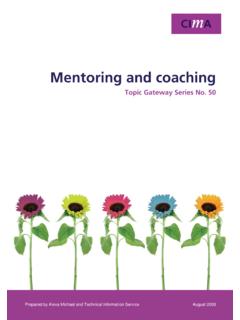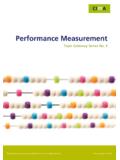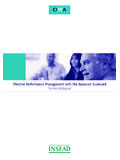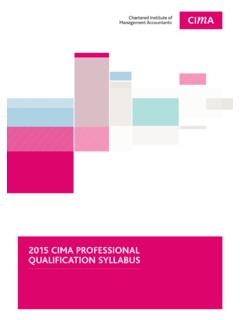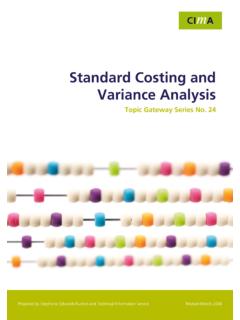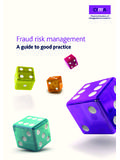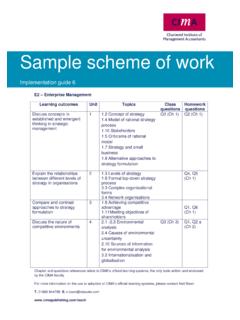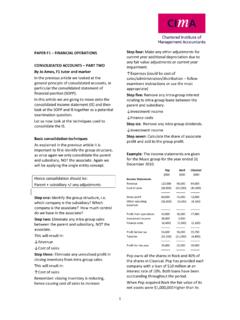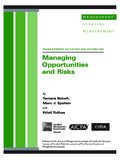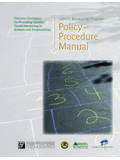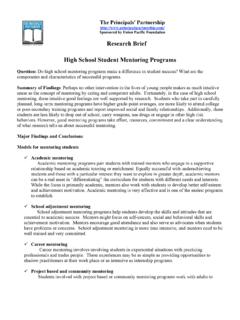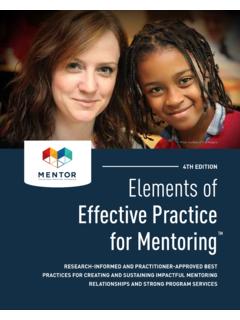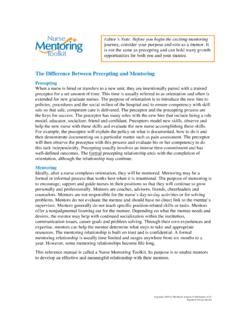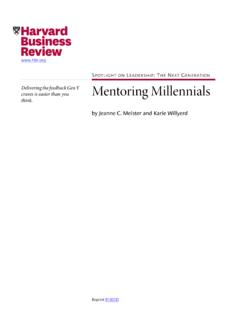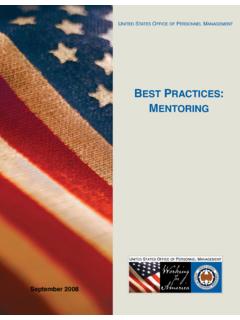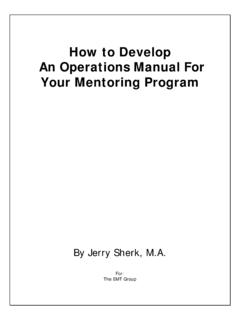Transcription of Mentoring and Coaching - an Overview - CIMA
1 Technical Briefing DEVELOPING AND PROMOTING STRATEGY JANUARY 2002. Mentoring and Coaching . An Overview Defining Coaching and . Mentoring Differences between a C IMA has been saying for a while now that finance professionals need to acquire a much broader set of skills if they are to survive in the world of modern business. The pace of change partly coach and a mentor driven by the advances in information technology and the pervading influence of globalisation has become relentless. The complexity Mentoring and Coaching parallels of work has increased while career paths have become less obvious due to the flattening of organisational structures. The skills and Finding a coach or a knowledge that were sufficient even 50 years ago are now proving mentor to be inadequate.
2 Managers and executives are having continually to acquire new skills, be it in IT or organisational strategy. The tradi- Barriers to effective tional method of one-off instruction designed to equip an individual Coaching and Mentoring with enough knowledge to last a lifetime has been superseded by the Reciprocity of relation- concept of lifelong learning. As far back as 1977, Gross wrote: ships Lifelong learning means self-directed growth. It means understanding Feedback and perfor- yourself and the world. It means acquiring new skills and powers the mance measurement only true wealth you can never lose. It means investment in yourself.'. Setting up a Mentoring . or Coaching procedure Benefits of Coaching T he Financial Management Accounting Committee (FMAC) of the International Federation of Accountants (IFAC) is about to publish a paper entitled The Role of the Chief Financial Officer in 2010'.
3 And Mentoring in organisations Amongst the CFOs and FDs interviewed, there seems to be a general consensus that the nature of finance professionals' tasks is changing Links to good manage- to encompass a much wider set of skills. Angela Holtham from ment Nabisco, for example, pointed out that this evolution is leaving the traditional underpinning of the finance role behind and embracing a Corporate strategy much wider and more common range of responsibilities. The role is References and further changing from being The Guardian of the Books' to the business side reading and away from the transaction side. I t is not surprising, then, that individuals and organisations are struggling to find new ways of learning that will reflect the varied and complex demands of a modern workplace.
4 Recent years have For further information please witnessed the emergence of Coaching and Mentoring in many contact: companies alongside the more traditional training methods. This Technical Services: briefing attempts to give a broad Overview of the concepts involved, Tel: +44 (0)20 7663 5441 as well as some basic pointers about the practicalities of establishing Fax: +44 (0)20 8849 2468. a corporate Coaching or Mentoring scheme. TECHNICAL BRIEFING Mentoring AND Coaching . T here is no longer a point in one's career where one can stop learning. People change jobs much more frequently nowadays and are faced with new responsibilities. Increased flexibil- ity demands a broader spectrum of skills. This is especially true for finance professionals. Over the last decade, their roles have been expanding to accommodate knowledge from other disci- plines and overlapping with other organisational functions.
5 But, whereas many will be given enough support to advance the specialist side of their knowledge (whether in their workplace or through professional bodies such as CIMA), most will be left with little time or opportunity to improve their soft' skills such as communication, listening and team-work. T raditionally, these have not been the sort of skills accountants acquired through their pro- fessional or academic training or were able to utilise in their everyday work. The emphasis . until recently had weighed heavily on the technical side. However, disregarding these skills could leave finance professionals seriously disadvantaged in an environment that increasingly favours inter-functional, joined-up practices. Definitions of Coaching and Mentoring word of warning, however there is no universal defini- Despite what some HR consultants may tell you, Coaching tion of either of these terms and therefore of the differ- and Mentoring are not recent phenomena.
6 Edification of ence between them. There will inevitably be some who some kind has existed since Homer's Mentor advised disagree with the citations below. This is why we list Odysseus and thus lent his name to this very human three similar though not identical sources. activity. It was probably the goddess Athena herself, dis- guised as Mentor, who guided Odysseus' son Telemachus A recent article in the Financial Times (Clutterbuck, 2001). in search for his father. Whatever the case, these wise and succinctly highlighted the main features of each as well trusted counsellors' have remained a feature of human as their differences: interactions throughout history. The common noun mentor' was first recorded in 1750. Interestingly, the Coaching is concerned primarily with performance and the etymology of the noun coach' is actually Hungarian.
7 It is development of definable skills. It usually starts with the derived from the word for a vehicle or a carriage the idea learning goal already most effective coaches being that instructors carried their pupils! share with mentors the capability to help the learner develop the skills of listening to and observing themselves, which Of course, the connotations of both of these words have leads to much faster acquisition of skills and modification of widened significantly since they were first recorded. behaviour. Coaches also share with mentors the role of Their relatively recent adoption into HR theory and critical friend confronting executives with truths no one else practice has turned them into verbs, implying institution- feels able to address with them.
8 Alised training strategy. According to a survey of training managers by the CIPD in 1999, some 87 per cent of UK. companies have some kind of a Coaching or Mentoring Whereas the coach is more likely to approach these issues scheme. There is certainly no shortage of books, papers through direct feedback, the mentor will tend to approach and conferences on the subject. them through questioning processes that force the executive to recognise the problems for themselves. Mentoring is There are many kinds of Coaching and Mentoring from usually a longer-term relationship and is more concerned with life Coaching to Mentoring schemes designed exclusively helping the executive determine what goals to pursue and for women or minorities to corporate peer-to-peer why. It seeks to build wisdom the ability to apply skills, Mentoring or buddy' systems.
9 In this briefing, we are knowledge and experience in new situations and to new specifically referring to Coaching and Mentoring in an problems. organisational context, whether formal or informal. (There are significant differences between the formal and informal approaches see Ehrich and Hansford, 1999.) The Coaching and Mentoring Network summarises it like this: Differences between a coach and a mentor Coaching : focuses on achieving specific objectives, usually So how do we define these activities? It is worth pointing within a preferred time period. out at the beginning that although they are distinct in both the format they adopt and the desired outcomes Mentoring : there are sufficient similarities and overlaps to allow us follows an open and evolving agenda and deals with to occasionally use them as synonyms in this briefing.
10 A a range of issues. 2. TECHNICAL BRIEFING Mentoring AND Coaching . Benabou and Benabou (2000) present the differences in a sion making, at whatever level of concern. It is not about tabular form: giving the right answers the mentee probably already knows them. This is why coaches and even mentors Coach Mentor don't have to have the same level of technical expertise Prot g 's learning is primarily Learning is focused on attitudes as their prot g s. Their task is not to magically solve the focused on abilities problems but to question how you go about looking for solutions. It is not psychological mollycoddling or a sub- Technical or professional focus Focus on personal and stitute for hard work. professional development Neither are one-off events but processes with distinct Effective use of the prot g 's Helps the prot g realise his/her evolutionary stages.
